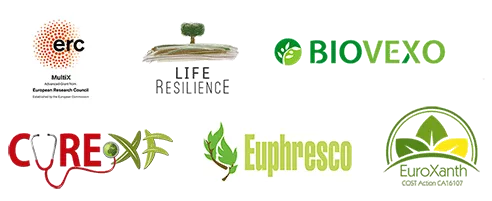3rd European Conference on Xylella fastidiosa and XF-ACTORS final meeting
Building knowledge, protecting plant health

900 people from more than 60 countries registered for the 3rd European Conference on Xylella fastidiosa and the final meeting of the XF-ACTORS project.
The event was held online from 26 April to 30 April 2021 and was organised by EFSA and XF-ACTORS with the active contribution of the major EU and transnational research initiatives tackling X. fastidiosa: BIOVEXO, CURE-XF, ERC MultiX, EUPHRESCO, EUROXANTH, and Life Resilience.
The overall objective of the conference was to take stock of the results from research that has taken place since X. fastidiosa was first detected in Europe in 2013.
The conference sessions gave an opportunity to present and discuss the latest findings, data and knowledge on X. fastidiosa as a pathosystem, including:
- Pathogen biology, ecology and genetics;
- Epidemiology and modelling of X. fastidiosa diseases;
- Host plant interactions and the search for resistant/tolerant germplasm;
- Surveillance and early detection tools;
- Vector biology and control;
- Endophytic microbial resources and their potential applications for X. fastidiosa control;
- Sustainable management strategies for prevention and reduction of the impact of X. fastidiosa diseases.
The programme included presentations and discussions on the above topics, followed by Q&A sessions. The latter resulted in an engaging dialogue among the participants, the speakers, as well as EFSA and XF-Actors staff.
The speakers’ presentations, the video recordings, the book of abstracts and the list of posters are available below.
XF-Actors Final Meeting, 26–28 April 2021
Monday, 26 April 2021
OPENING CEREMONY & SESSION 1 - Achieving practical outcomes from genetic and biological studies (video recording).
Anne Sicard: Introduction and adaptation of an emerging pathogen to olive trees in Italy
Giusy D’Attoma: Unravelling distinctive features ofXylella fastidiosa strain ‘De Donno’
Pasquale Saldarelli:Xylella fastidiosa and olive interactions: the key role of the plant cell wall
Tuesday, 27 April 2021
SESSION 2 - Vectors and control strategies (video recording).
Domenico Bosco: New insights onXylella fastidiosa subsp. pauca vector transmission to olive plants
Sabina Avosani: Vibrational-disruption of the feeding behavior of a plant pathogen vector
Marina Morente: Host plant selection by Philaenus spumarius: using ground covers as trap crops
SESSION 3 - Control of the bacterium in the host plants (video recording).
Maria L. Domingo-Calap: Isolation and characterization of bacteriophages againstXylella fastidiosa
Valeria Scala: Signals in pathogen and host sensing: free fatty acid and oxylipins
Wednesday, 28 April 2021
SESSION 4 & CONCLUSIONS - Implementation and harmonization of diagnostic protocols, surveillance and modelling (video recording)
Alexander Mastin: Improving early detection surveillance forXylella fastidiosa in Apulia
Françoise Petter: How did XF-ACTORS contribute to the work of NPPOs
Antonio Vicent: Scientific contributions of XF-ACTORS to the EU plant health regime
Angelo Di Mambro:Xylella fastidiosa, the social and media impact in plant health management
3rd European Conference on Xylella fastidiosa, 29–30 April 2021
Thursday, 29 April 2021
OPENING CEREMONY & SESSION 1 - Advances on pathogen biology, ecology and genetics (video recordings)
Aina Baró: Aggressiveness of Spanish isolates ofXylella fastidiosa to almond cultivars
Jianchi Chen: Genome rearrangements ofXylella fastidiosa strains in US and updates on X. taiwanensis
Silke Robatzek: The Arabidopsis immune receptor EFR confers immunity againstXylella fastidiosa
SESSION 2 - Understanding vectors biology and pathogen transmission (video recording)
Friday, 30 April 2021
SESSION 3 - From epidemiological modelling to surveillance and early detection (video recording)
Sybren Vos: Guidelines for risk-based survey design forXylella fastidiosa
SESSION 4 - Towards sustainable management strategies (video recordings)
SESSION 5 & CONCLUSIONS - What priorities for research onXylella fastidiosa? Science support to stakeholders needs (video recording)
Anna Rufolo: New research priorities onXylella fastidiosa from EU farmers perspective
Josep M. Pagès: New research priorities onXylella fastidiosa from EU nurserymen perspective
Vicente Dalmau Sorli: What research needs in the outbreak areas? A risk manager perspective
Gisela Quaglia: Horizon Europe and Plant Health – opportunities forXylella fastidiosa R&I
Book of Abstracts
E-poster session
An online e-poster session started the week before the conference: posters accepted have been published on the open access Zenodo platform and promoted through Twitter by both organisers and authors.
The connected poster competition identified the poster Impact of insecticides on the feeding behaviourof Philaenus spumarius associated to the transmission ofXylella fastidiosa as the one which received the highest number of social interactions on Twitter. The presenter author Clara Lago, from the Instituto de Ciencias Agrarias, Madrid, Spain, was interviewed by EFSA.
Young researcher initiative
Twelve young researchers were selected from those who had an e-poster accepted for the conference. They gave a short presentation of their research during the conference.
They have also been interviewed about their studies and research work; the videos are available on the EFSA YouTube channel.
Contact points
- Xylella_conference [at] efsa.europa.eu (Xylella_conference[at]efsa[dot]europa[dot]eu)
- Info [at] xfactorsproject.eu (Info[at]xfactorsproject[dot]eu)

Panel

Experts in pest risk assessment, plant pathology, epidemiology, and ecology.